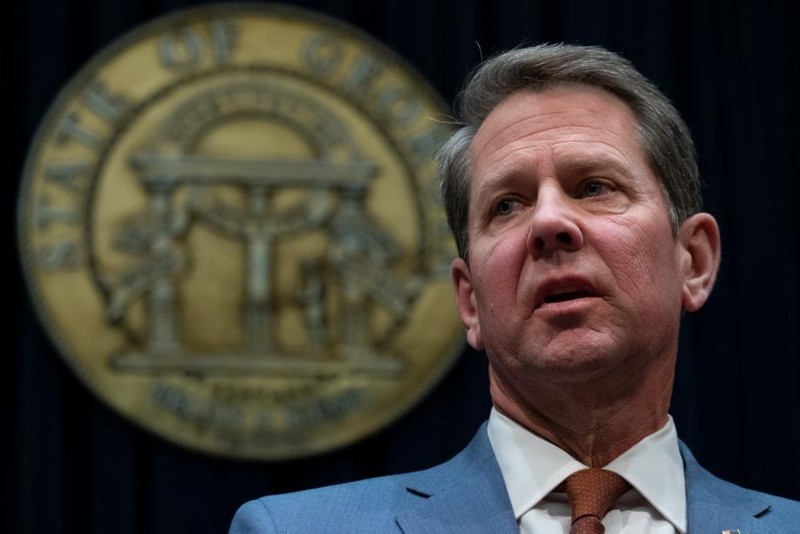Gov. Brian Kemp on Wednesday said he is preparing a statewide shelter-in-place order across Georgia to try to curb the spread of a coronavirus pandemic, a turnabout after weeks of balking at taking more drastic steps to combat the disease.
The new rules, which he will issue on Thursday, are set to run from Friday through April 13. He also said he would immediately sign an order that would close K-12 schools through the rest of the academic year.
The Republican faced mounting pressure from public health officials, local leaders and prominent politicians who warned that a failure to take more sweeping action would further strain Georgia’s healthcare system and lead to more deaths.
“I want to encourage my fellow Georgians to hang in there. I know you’re tired of this,” he said at a windy press conference outside the state Capitol. “But we must first overcome the obstacles in our path.”
Kemp had balked at more stringent restrictions to combat the disease, in part because he was worried more severe bans would cripple the economy in parts of the state where there are few known cases of the disease.
But he reversed course on Wednesday as a growing number of other Republican governors, including the leaders of Florida, Texas and South Carolina, instituted broader limits on mobility and shuttered more business to try to counter the disease.
He said his decision was triggered by “game-changing” new projections on the disease’s spread in Georgia. He also said he was informed of new data that this virus “is now transmitting before people see signs.”
“Those individuals could have been infecting people before they ever felt” symptoms, he said. “We didn’t know that until the last 24 hours.”
Health officials have long known that the virus could be transmitted this way, though the Centers for Disease Control and Prevention recently changed their guidance on this type of asymptomatic infection.
That contributed to significant changes in state projections on testing, hospital capacity and virus transmission rates that led Dr. Kathleen Toomey, the head of Georgia’s public health department, to endorse more severe restrictions.
“It’s a combination of recognizing there’s a large number of people out there who are infected and who are infected, who are asymptomatic, who never would have been recognized under our old models,” she said, “but also seeing the community transmission that we’re seeing.”
‘All over the place’
Kemp said the shelter-in-place order will include exceptions for grocery stores, medical supplies and certain manufacturing, among other carveouts. Kemp aides say it’s likely to allow restaurants to serve takeout but ban dine-in service.
“People have to eat. We have to continue to process our food supply. We have to have our pharmacies open, we have to have Georgia-based companies that are making PPE, medical supplies,” he said. “These are hard things to figure out.”
The governor said law enforcement would actively require residents to comply with the restrictions, though he urged Georgians not to panic and make a run on stores.
“The grocers are ready for this. They’ll be ready to restock,” he said. “People don’t need to be worried about buying for two weeks or two months.”
The governor earlier shut down bars, banned many gatherings, canceled public school through late April and urged the “medically fragile” and others vulnerable to the disease to stay at home.
But he expressed concern at taking more sweeping steps, such as a mandatory shelter-in-place order, in part because he worried they could cripple the economy in areas where there’s not yet confirmed cases of the virus.
Instead, he’s given local leaders leeway to take steps on their own, and dozens of cities and counties have enacted curfews, shuttered non-essential businesses and issued shelter-in-place orders.
That’s led to a hodgepodge of uneven restrictions across the state that morph by the day, and rising criticism from local officials that stricter uniformity is needed.
And his top aide fanned more confusion by warning of an “overreach” by local officials over the weekend.
His announcement was preceded by sharpening criticism from local officials.
Savannah Mayor Van Johnson said “cities need some consistency – because right now, we’re all over the place.” And state Sen. Nikema Williams, the chair of the Democratic Party of Georgia, accused Kemp of taking half-measures.
“We are in a crisis, our governor is dragging his feet, and playing catch-up when millions of lives are at stake,” said Williams, who revealed last week that she tested positive for the disease.
The new shelter-in-place rules were greeted with guarded relief by his critics.
“Better late than never,” said state Rep. Scott Holcomb, D-Atlanta. “Crises demand big and fast responses. Instead, we’ve had nothing but incrementalism. That means it’s going to take longer and longer to move past this.”
Support real journalism. Support local journalism. Subscribe to The Atlanta Journal-Constitution today.
See offers.
Your subscription to the Atlanta Journal-Constitution funds in-depth reporting and investigations that keep you informed. Thank you for supporting real journalism.
















